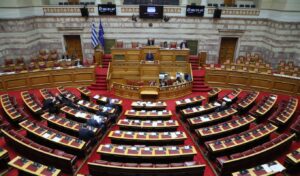While OPEKEPE may be the main topic in the political agenda over the past five days, developments in Greece’s broader “neighborhood” are moving at a rapid pace and the government wants to take all appropriate measures and initiatives in an effort to stay ahead of them. The Commissioner for Home Affairs and Migration, Magnus Brunner, is already in Athens and at 8:15 AM will meet at the Ministry of Foreign Affairs with Giorgos Gerapetritis, while immediately after, at 9 AM he will meet with Kyriakos Mitsotakis at the Maximos Mansion. Within the coming days, the Austrian Commissioner will travel with the relevant Migration ministers from Italy, Greece and Malta to eastern and western Libya. “The issue of increased flows from Eastern Libya is indeed a cause for concern, not exclusively for Greece, but for all of Europe,” he noted (speaking to “Vima”).
Gerapetritis travels to Libya – Greece’s “weapons” against the Turkish-Libyan approach
At the same time, Mr. Gerapetritis is planning his trip to Tripoli and Benghazi at the latest by early next week, extending a hand of friendship and cooperation to our neighboring (across the sea) country. “Greece explicitly and consistently supports good neighborly relations with Libya and we have called on Libya to start the discussion on maritime zone delimitation and our pursuit is to have a delimitation solution that will be based precisely and only on the Law of the Sea,” Foreign Minister Mr. Gerapetritis emphasized yesterday from the parliament podium, who characterized the illegal Turkish-Libyan memorandum as “null and void” because, as he stressed, “it has absolutely no basis in international law.”
Greece exercises its sovereign rights in the field always in accordance with International Law and the Law of the Sea, they emphasize from the Maximos Mansion, reminding that in this framework it proceeded with the delimitation of Exclusive Economic Zone with Italy and Egypt, has mapped its Maritime Spatial Planning and has launched surveys for the search of potential hydrocarbon deposits south of Crete.
On the diplomatic front, as they also note, a few days ago the European Council once again adopted conclusions that are extremely positive for Greece, both regarding our country’s sovereign rights and on migration. They add that regarding migration, the EU has recognized the risk of consolidating the new migration route from Libya to Crete and appears willing to take measures. Our country has anyway taken action to address networks of inhumane traffickers, sending two Navy frigates outside Libyan territorial waters.
The additional “weapon” that the Greek government now has, after intense diplomatic backstage work, from the text with the European Council conclusions voted by the Summit late Thursday evening confirms the EU position that the memorandum “violates the sovereign rights of third states, is not consistent with the Law of the Sea and cannot produce legal consequences for third states.” Essentially, as government sources emphasize, it is confirmed by member states that the memorandum is null and cannot have legal consequences for third countries.
The unanimous inclusion of the above proposal in the EU conclusions text occurred 48 hours after Libya and Turkey signed a cooperation memorandum for hydrocarbon exploration and extraction in four maritime areas. The map circulated by the Libyan oil company and allegedly depicting these areas, “at first glance appears to move south of the median line,” as diplomatic sources mentioned, who emphasized that “in any case Greece will not accept any violation of its sovereign rights.”
In yesterday’s cabinet meeting, Kyriakos Mitsotakis chose to start his intervention with a reference to Libya. Libya’s reactions “to some extent are due precisely to the fact that Greece exercises its sovereign rights in the field, with surveys for deposits within the Greek EEZ, with the launch of maritime spatial planning – a pending issue that comes from the past – and of course with our presence, through the Armed Forces, in protecting our homeland’s southern maritime borders from trafficker gangs,” the prime minister estimated, speaking at the start of the cabinet meeting.
Mr. Mitsotakis emphasized in the cabinet that “it is important to say that once again the European Council confirms that this text between Turkey and some Libyan authorities is illegal. This is now said, once more, with Europe’s seal and with Greek responses being given responsibly on the ground.” He also left hints for parties and politicians in Greece. “Let certain habitually worried people within our borders not be disturbed, therefore, and above all let us not determine our own positions based on the arguments circulated by our neighbors,” he characteristically stated.




